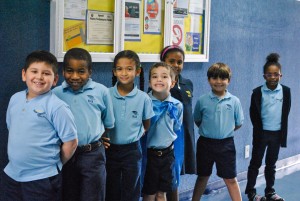
Last year, as Eve and Allen Walker prepared their children to start kindergarten at Abundant Life Christian Academy, they had a conviction. If they were going to exercise school choice for their own daughter, they would try to do the same for Elias*, one of their foster children, who is about the same age.
“Anything that we would do with our own child is important to him, for his growth and development,” Allen Walker said in an interview.
With Elias, there was a twist — the kind of unexpected turn of events that can often affect foster children.
The Walkers had applied in the spring for a tax credit scholarship that would help them send their daughter to Abundant Life. They had not done the same for Elias, because they expected him to rejoin his birth mother by the time school began. Then, last summer, with the start of kindergarten approaching, they learned that would not happen after all.
Since Elias would remain in their care, they applied for a scholarship that would allow him to enroll at Abundant Life with their daughter. Days before school started, they were able to get one.
Cases like theirs have prompted changes to the laws governing Florida’s tax credit scholarship program. Foster children are eligible for the scholarships, much like they are often categorically eligble for school lunch programs and other assistance. (Step Up For Students, which co-hosts this blog and employs the author of this post, helps administer the scholarships for nearly 70,000 low-income students in Florida).
A new state law, approved last year, allows foster children to apply for scholarships year-round. The change was intended to help ensure they could apply for scholarships even if their circumstances changed suddenly – if, for example, they received a new placement that caused them to miss the normal application window. The revised law also extends scholarship eligibility to children placed in out-of-home care.
This year, Elias was one of 32 children who signed up for tax credit scholarships as they enrolled in kindergarten. Overall, more than 100 foster children received scholarships for the first time this year.
The Walkers are experienced foster parents, having brought some 30 children into their home since 2008. They adopted their daughter out of foster care. Allen Walker said they strive to create normalcy, making sure their foster children can join other kids in activities like school-sponsored soccer teams.
Like may children who have been uprooted from their homes, Elias went through a period of emotional turmoil. Walker said he’s seen signs of growth, after almost a year at a faith-based school that emphasized his personal development. Elias’ once-frequent violent outbursts have become rare, something Walker said can be attributed in part to the environment where he spends his school days.
“He’s just blossomed,” said Stacy Angier, Abundant Life’s principal. “He’s done really well.”
It’s important for schools to create a sense of security for children whose lives have been marked by instability, Angier said. They may feel at home in a smaller, more intimate school environment, and benefit from having strong teachers who offer positive reinforcement. It also helps when their caretakers are invested in their education.
Walker said that without the scholarships, many foster parents would struggle to afford tuition for private schools. The program, he said, helps foster parents support their children in ways that might otherwise be out of reach.
As for Elias, he said, “my goal is, as long as he’s with us, for him to stay at that school, because I believe that what he’s getting there is vital for his future.”
*The names of foster children in this story have been changed to protect their identities.



[…] Read Full Article […]